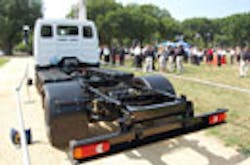WASHINGTON, DC. An all-electric medium-duty commercial truck is due to start rolling off a transatlantic production line in September to fill orders placed by prominent U.S. companies ranging from utility companies to beverage and snack distributors.
At a special event held on the National Mall in front of the U.S. Capitol, Smith Electric Vehicles U.S., which is owned by Private Investors Management and The Tanfield Group Plc, both based in Great Britain, showed off the Smith Newton all-electric commercial truck it will sell here.
The Smith Newton will be offered with a choice of three gross vehicle weight ratings (GVWRs): 16,535, 23,148, or 26,455 lbs. The truck boasts a top speed of 50 mph and a range of just over 100 miles on a single charge. It takes roughly six to eight hours to fully recharge its batteries.
Read entire All-electric medium truck rolling out here article ...
WASHINGTON, DC. An all-electric medium-duty commercial truck is due to start rolling off a transatlantic production line in September to fill orders placed by prominent U.S. companies ranging from utility companies to beverage and snack distributors.
At a special event held on the National Mall in front of the U.S. Capitol, Smith Electric Vehicles U.S., which is owned by Private Investors Management and The Tanfield Group Plc, both based in Great Britain, showed off the Smith Newton all-electric commercial truck it will sell here.
The Smith Newton will be offered with a choice of three gross vehicle weight ratings (GVWRs): 16,535, 23,148, or 26,455 lbs. The truck boasts a top speed of 50 mph and a range of just over 100 miles on a single charge. It takes roughly six to eight hours to fully recharge its batteries.
Kevin Beck, Smith’s vp-business development, told FleetOwner that the Smith Newton’s chassis and cab are built in the Czech Republic, then shipped to Smith’s assembly facility in Kansas City, MO, where the vehicle’s two lithium-ion battery packs (weighing anywhere from 7,392 lbs to 16,280 lbs, depending on the truck’s GVWR), drivetrain, and 120-kilowatt induction motor are installed. From start to finish – including the shipment of the chassis and cab from Europe – building one Smith Newton takes roughly two to three weeks.
Beck noted the company plans to roll out an all-electric version of the Ford Motor Co.’s Transit Connect van in partnership with the automaker early next year.
Major corporations with significant private fleet operations including Coca Cola, AT&T, and Frito Lay along with utility companies such as Pacific Gas & Electric and Kansas City Power & Light, have ordered Smith Newtons as they view the truck’s zero-emission profile as a good fit with urban medium-duty operations.
“We’ve been looking at using a mixture of alternative fuel in our fleet, from CNG [compressed natural gas] to hybrid-electric passenger vehicles and trucks,” Jerome Webber, vp-fleet operations for AT&T, told FleetOwner. “We conducted a six- to nine-month study looking at all the various alternatives to gasoline and diesel for our fleet and found all-electric trucks make a good fit in city operations. It gives us the potential to significantly reduce emissions while increasing our fleet’s overall fuel savings.”
Webber added that AT&T has committed to convert 20% of its fleet – roughly 15,000 vehicles – to a mix of alternative fuels, including all-electric trucks, over the next several years.
Sen. Samuel “Kit” Bond (R-MO), whose state is home to Smith’s U.S. assembly plant, pointed out that perhaps the biggest benefit of the Smith Newton all-electric truck will be its fuel savings. “All-electric trucks are good for the environment, yes, but good for the economy as well,” Bond said at the event. “These all-electric trucks make good sense – they increase fuel economy while reducing pollution.”
About the Author
Sean Kilcarr
Editor in Chief
Sean Kilcarr is a former longtime FleetOwner senior editor who wrote for the publication from 2000 to 2018. He served as editor-in-chief from 2017 to 2018.
